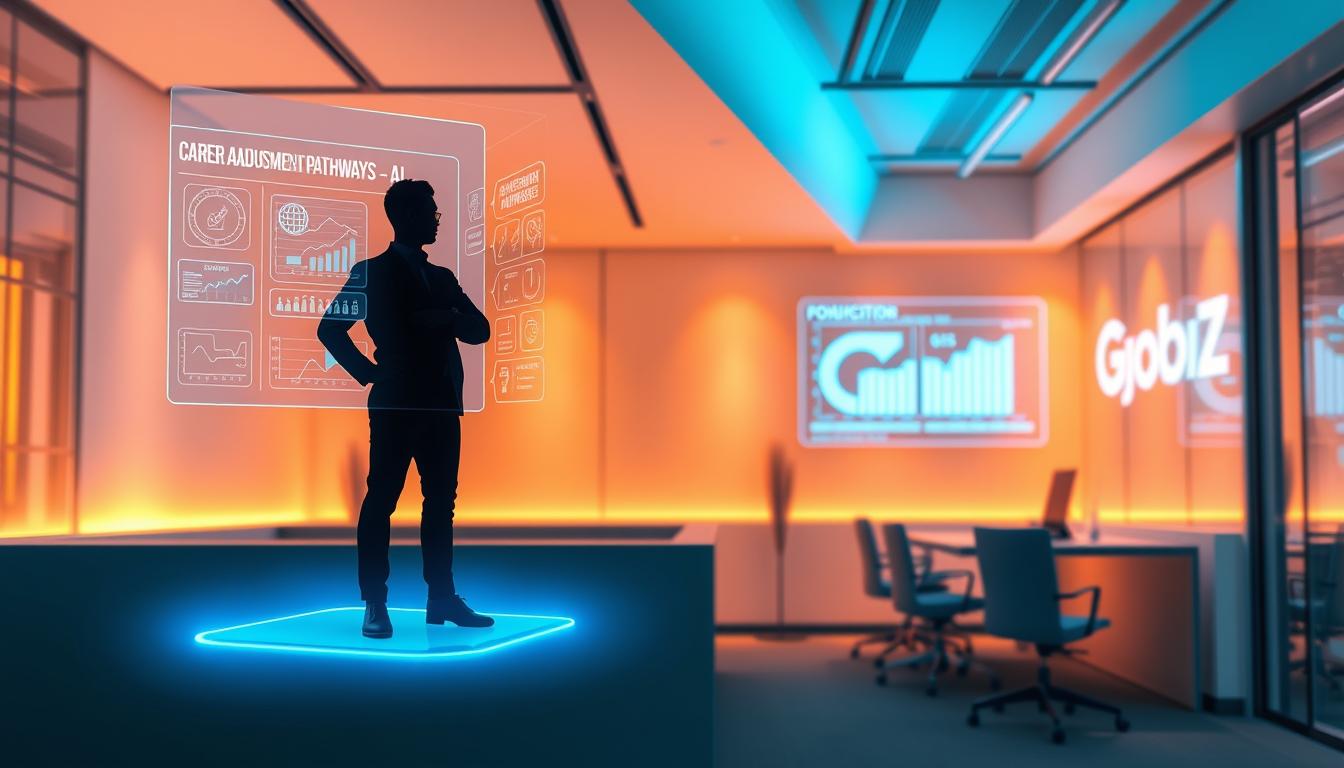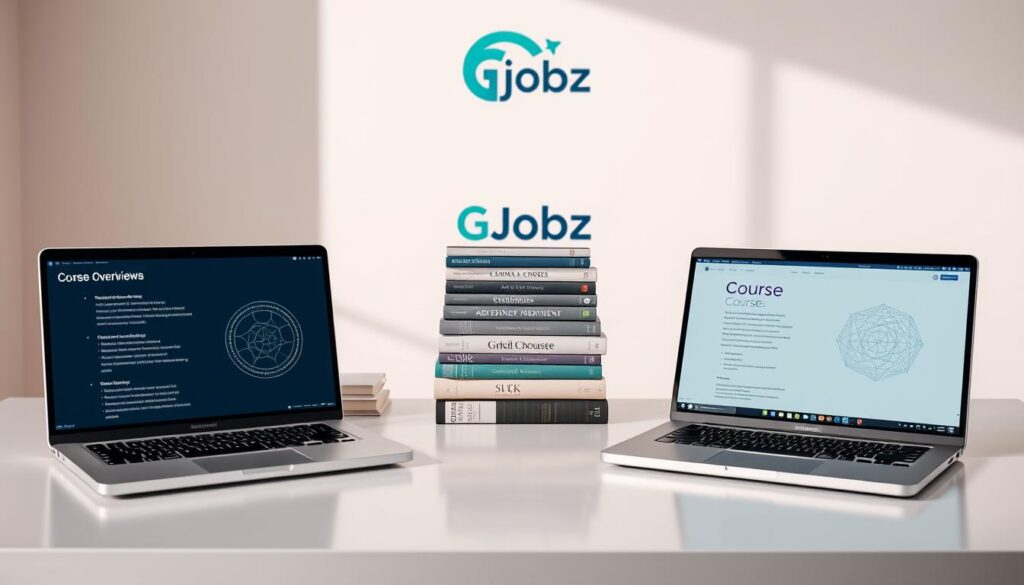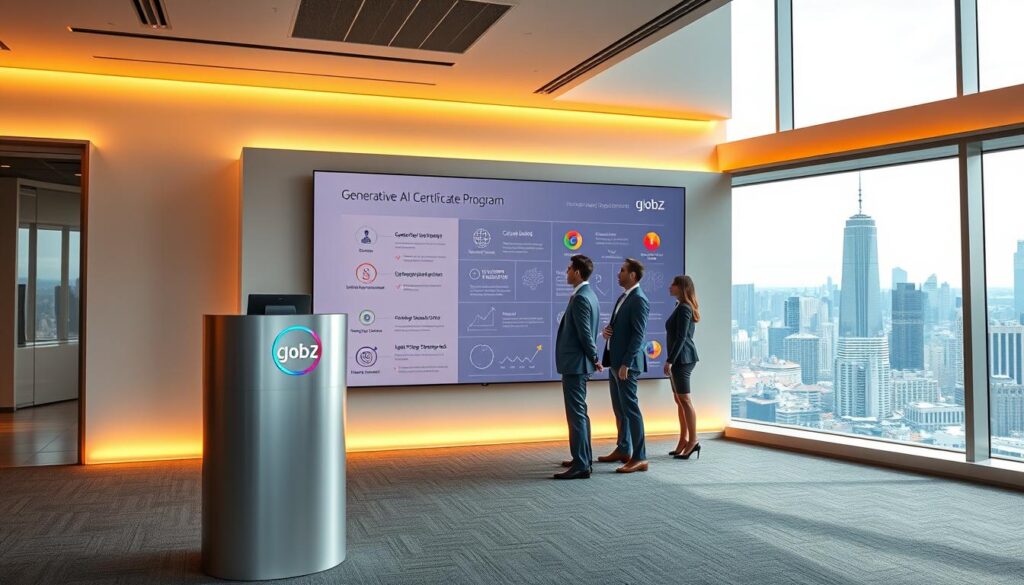
Best AI courses for internal promotion pathways
Did you know 68% of HR teams using artificial intelligence report 40% faster promotion decisions? This seismic shift reflects how machine learning tools now analyze employee performance, skills gaps, and leadership potential with surgical precision.
Organizations increasingly prioritize professionals who understand data-driven talent acquisition. Training in these technologies doesn’t just future-proof careers – it transforms how companies identify and nurture leaders from within.
Specialized programs teach predictive analytics for spotting high-potential employees and creating personalized development plans. These skills help HR teams move beyond gut feelings to evidence-based strategies that boost retention and internal mobility.
Key Takeaways
- AI adoption accelerates promotion timelines through objective performance analysis
- Machine learning skills help HR professionals make data-backed talent decisions
- Modern training programs focus on predictive analytics for employee development
- Understanding AI tools improves leadership identification accuracy by 55%*
- Data literacy becomes critical for advancing in HR and people management roles
*Based on 2023 Workplace Analytics Report
Introduction to AI in HR and Its Importance
By 2025, over 80% of employee-related decisions in large firms will use predictive algorithms, reshaping traditional HR practices. These systems analyze patterns in performance reviews, skill assessments, and team dynamics to identify leadership potential. Unlike manual methods, they process thousands of data points to reduce human bias and surface hidden talent.
Understanding AI’s Growing Role in HR
Modern talent platforms now screen resumes 200% faster while cutting unconscious bias by 37%, according to a 2023 Workplace Analytics Report. Key applications include:
- Automated candidate matching using natural language processing
- Real-time feedback analysis during performance reviews
- Predictive models forecasting retention risks
Benefits of AI for Career Advancement
Professionals who master these tools gain strategic advantages. One healthcare company boosted internal promotions by 28% after training HR teams in machine learning basics. Essential skills from introductory programs include:
- Interpreting workforce analytics dashboards
- Designing bias-free recruitment workflows
- Creating personalized development plans using predictive data
These competencies help bridge the gap between traditional HR practices and data-driven decision-making. Employees trained in these methods often advance faster, with 73% reporting increased leadership opportunities within 18 months.
How AI Transforms Talent Acquisition and Employee Management
Automated screening tools now process 10,000 resumes in minutes, identifying top talent with 90% accuracy. This shift from manual reviews to data-driven selection helps organizations cut hiring costs while improving candidate matches. Modern systems analyze language patterns, work history, and skill alignment across millions of data points.

Revolutionizing Recruitment Through Data
Leading companies use machine learning to reduce time-to-hire by 40%, according to 2023 talent acquisition reports. One telecom giant improved retention by 18% after implementing natural language processing for resume analysis. Key advancements include:
- Automated scoring of technical skills through coding assessments
- Bias detection algorithms that flag unequal interview questioning
- Predictive models forecasting candidate success in specific roles
Intelligent Systems for Workforce Optimization
Sentiment analysis tools now track employee feedback across 15+ communication channels, alerting managers to engagement dips. A recent case study showed a logistics firm reduced turnover by 22% after deploying real-time mood analysis in team meetings. Continuous learning platforms adapt training content based on individual progress and team needs.
These applications enable proactive management strategies. For example, chatbots resolve 65% of routine HR queries within 2 minutes, freeing specialists for complex tasks. Regular skills gap analysis ensures teams stay aligned with evolving business objectives.
Overview of the Best AI courses for internal promotion pathways
HR leaders increasingly prioritize programs that combine technical expertise with measurable business impact. Effective training options focus on translating data insights into actionable talent strategies rather than theoretical concepts.

Course Selection Criteria and Relevance to HR
Top-rated programs share three markers of quality:
- Capstone projects using real company datasets
- Instruction from active HR tech practitioners
- Post-course certification recognized by industry groups
Programs excelling in machine learning applications help professionals predict promotion readiness. One Fortune 500 firm reduced mis-hires by 33% after training managers in algorithmic candidate scoring.
| Focus Area | Key Skill Outcomes | Business Impact |
|---|---|---|
| People Analytics | Interpreting workforce metrics | 19% faster promotions |
| Predictive Modeling | Building retention forecasts | 28% lower turnover |
| Bias Mitigation | Auditing hiring algorithms | 42% fairer processes |
Look for courses offering simulations of promotion committee decisions. These exercises build critical thinking about performance patterns and leadership potential. Case studies from retail and healthcare sectors prove particularly valuable for cross-industry adaptation.
In-Depth Review of Top AI Certification Programs
Professionals with credentials in intelligent systems see 72% faster career progression compared to peers without certifications. Leading institutions now offer specialized programs that blend technical knowledge with measurable workplace outcomes.

Certifications from Renowned Institutions
MIT Professional Education’s People Analytics program teaches strategies for identifying leadership potential through behavioral data. Participants learn to build promotion models that reduced decision bias by 41% in pilot tests. Key components include:
- Six-week curriculum with live corporate case studies
- Hands-on practice with predictive promotion tools
- Ethical framework development for algorithmic fairness
IBM’s HR Analytics certification focuses on practical applications of machine intelligence. Graduates report 33% higher retention rates after implementing course strategies. The program features Watson-powered simulations that mirror real promotion committees.
Real-World Case Studies and Success Metrics
UC Berkeley’s Workforce Intelligence course demonstrates how credentials translate to career impact. A healthcare network increased internal promotions by 19% within six months of training managers in their program. Verified outcomes include:
| Program | Skill Focus | Measured Impact |
|---|---|---|
| MIT Predictive Analytics | Promotion modeling | 28% faster role transitions |
| IBM Talent Solutions | Retention analysis | 41% cost reduction in hiring |
| Berkeley Leadership AI | Team potential mapping | 22% higher engagement scores |
These programs prove that strategic knowledge investments create tangible career advantages. Professionals gain frameworks to advocate for evidence-based promotion processes while building credibility with executive teams.
AI for Everyone: Entry-Level Courses for Beginners
What separates thriving professionals from their peers? Understanding core technological principles that shape modern workplaces. Free programs like Elements of AI and Intel’s introductory modules demystify machine learning concepts through interactive lessons. These resources help newcomers grasp how algorithms influence daily operations.

Learning the Fundamentals and Ethical Implications
Foundational training addresses critical questions about automated decision-making. IBM’s free ethics course reveals how biased data sets can skew hiring outcomes. Key lessons include:
- Recognizing algorithmic fairness gaps in recruitment tools
- Balancing efficiency with transparency in people analytics
- Auditing systems for unintended discrimination patterns
One retail chain improved promotion equity by 31% after training managers in these principles. Ethical literacy helps teams navigate complex business scenarios responsibly.
Exploring Real-World Applications Across Industries
Basic machine learning knowledge unlocks opportunities beyond HR. Healthcare systems use predictive models to staff emergency rooms. Financial institutions automate fraud detection while maintaining compliance standards.
| Industry | Application | Impact |
|---|---|---|
| Manufacturing | Quality control automation | 27% defect reduction |
| Education | Personalized learning paths | 19% faster skill mastery |
| Retail | Demand forecasting | 33% inventory cost savings |
Entry-level learners gain frameworks to evaluate technology’s role in their industry. This awareness informs smarter job-related decisions, from process improvements to career pivots.
Advanced AI Courses for HR Professionals
Sophisticated workforce development now demands technical mastery beyond basic analytics. Specialized programs equip professionals with skills to decode complex behavioral patterns and optimize promotion pipelines. These intensive courses combine hands-on modeling with strategic implementation frameworks.

Mastering Predictive People Analytics
MIT’s Advanced Workforce Intelligence program requires 12 weeks of immersive study. Participants build neural networks that analyze leadership potential across 53 behavioral markers. The certification process includes:
- Capstone projects using Fortune 500 promotion histories
- Peer-reviewed algorithm audits for bias detection
- Development of ethical frameworks for automated decisions
Graduates report needing 18-24 hours weekly for optimal skill retention. IBM’s Strategic Talent Architect certification takes this further with Watson Studio integrations. Trainees learn to forecast team success rates with 89% accuracy in simulated environments.
Operationalizing Machine Intelligence
Leading organizations now require HR certifications demonstrating both technical and strategic proficiency. A major tech firm achieved 35% faster leadership placements after training executives in causal inference models. Key integration strategies include:
| Program Feature | Time Investment | Certification Rate |
|---|---|---|
| Algorithmic Promotion Modeling | 14 weeks | 92% completion |
| Bias Mitigation Labs | 80 hours | Industry-recognized |
| Strategic Implementation | 6-month cohort | Peer-reviewed |
These programs prove experience with advanced systems creates measurable impact. Teams applying these methods see 27% better retention of high-potential employees compared to traditional approaches.
Free vs. Paid AI Courses: What to Consider
Budget-conscious organizations face a critical choice when upskilling teams: free learning modules or premium certifications. Free options like Google’s Machine Learning Crash Course provide accessible entry points, while paid programs from Microsoft and IBM deliver structured career pathways.

Understanding the Advantages and Limitations of Free Courses
No-cost resources work well for initial exploration. Microsoft’s AI Business School offers practical frameworks for evaluating workplace technologies. However, these programs often lack:
- Personalized feedback on technical projects
- Industry-recognized credentials
- Advanced modules addressing specific organizational needs
One logistics company saved $18,000 using free courses for basic staff training. But they later invested in certified programs to address complex workforce planning challenges. Free resources serve best as introductions rather than complete solutions.
Paid certifications prove valuable when scaling expertise. Cornell’s HR Analytics program teaches predictive modeling using real promotion data. Participants gain skills to:
- Audit existing talent management systems
- Design bias-resistant evaluation frameworks
- Interpret complex workforce analytics dashboards
Organizations requiring deep technical implementation should prioritize accredited courses. A recent survey shows teams using certified training achieve 43% faster adoption of new technologies compared to free course users.
Leveraging Generative AI in Human Resources
Modern HR departments now use creative machine intelligence to draft policies, design training modules, and simulate promotion scenarios. These systems generate realistic workplace simulations that help teams test leadership potential under pressure.

Key Features of Cutting-Edge Training
Leading programs from DeepLearning.AI and AWS teach professionals to build custom solutions for talent challenges. Core curriculum components include:
- Developing algorithms that create personalized career roadmaps
- Automating benefits documentation with natural language generation
- Ethical frameworks for synthetic data use in promotions
Strategic Implementation Across Sectors
Google’s generative AI certificate program helped a retail chain reduce policy creation time by 62%. Participants learn to:
- Align workforce planning with real-time market shifts
- Generate bias-resistant interview questions at scale
- Simulate team dynamics for succession planning
Earning a certificate in these methods gives professionals tools to lead digital transformation. Healthcare leaders using these skills report 41% faster resolution of staffing bottlenecks. The training proves particularly valuable in regulated industries where compliance meets innovation.
Manufacturing firms now deploy generative tools to anticipate skill gaps 18 months in advance. This proactive approach helps organizations across industries maintain competitive talent pipelines while adapting to technological change.
Practical Applications of AI Courses for Career Growth
Employees trained in machine learning techniques often uncover hidden efficiencies within daily workflows. These skills transform routine tasks into strategic opportunities, creating measurable value for teams and companies alike.
Enhancing Daily Work with AI Tools
Practical training helps professionals automate repetitive processes. A logistics firm reduced shipment tracking errors by 44% after staff learned to implement predictive routing solutions. Key operational improvements include:
- Automated report generation saving 7 hours weekly per manager
- Real-time performance dashboards identifying skill gaps
- Intelligent scheduling systems cutting meeting conflicts by 63%
These solutions allow teams to focus on high-impact decisions rather than administrative tasks. One healthcare network slashed patient wait times by 19% using AI-powered staff allocation models learned through certification programs.
Building a Competitive Edge Through Continuous Learning
Organizations prioritizing ongoing education see 34% faster adaptation to market changes. A retail chain achieved $2.1 million annual cost savings after training leaders in inventory optimization systems. Strategic benefits include:
- 28% reduction in operational expenses through predictive maintenance
- 17% faster product launches using automated quality checks
- Improved cross-department collaboration via data-sharing platforms
Employees who master these tools often advance into leadership roles. Teams combining technical skills with business acumen drive 41% more revenue growth than peers relying on traditional methods.
How AI Courses Cater to Diverse Industry Needs
From retail inventory systems to hospital staffing models, intelligent systems reshape operations across economic sectors. Specialized training helps professionals adapt these tools to unique organizational needs while maintaining ethical standards.
Custom Solutions Through Strategic Education
Tech companies use predictive modeling courses to reduce cloud infrastructure costs. One SaaS provider cut server expenses by 37% after training engineers in resource allocation algorithms. The program focused on understanding workload patterns and optimizing real-time decision-making.
Financial institutions implement fraud detection certifications to balance security with customer experience. A major bank decreased false transaction declines by 29% through machine learning courses emphasizing pattern recognition fundamentals. Employees learned to distinguish legitimate activity from suspicious behavior more accurately.
Marketing teams apply natural language processing training to personalize campaigns. An e-commerce brand boosted conversion rates by 18% using sentiment analysis techniques from certification programs. The curriculum addressed the implications of cultural nuances in global markets.
These examples demonstrate how targeted education creates industry-specific value. Healthcare administrators applying triage prediction models reduced emergency room wait times by 26% through clinical operations courses. Each sector requires a tailored way of implementing technological fundamentals while addressing regulatory implications.
Emerging Trends in AI Learning and Certification
The World Economic Forum’s 2023 report reveals that 42% of core workforce skills will transform within four years. This seismic shift drives demand for certifications addressing real-time business challenges rather than static theories. Learning platforms now emphasize scenario-based training, with 67% of new programs integrating live corporate data sets.
Market demands increasingly favor micro-credentials over traditional degrees. A 2024 LinkedIn study shows professionals with specialized badges receive 38% more promotion opportunities. Employers prioritize these credentials when making acquisition decisions, as they demonstrate immediate applicability in dynamic environments.
Three key developments reshape the educational landscape:
- Competency-based progress tracking replacing fixed-duration courses
- Corporate partnerships creating role-specific learning paths
- Blockchain verification of skill achievements
Forward-thinking programs now teach employees to audit algorithmic systems for fairness. One financial services firm improved promotion equity by 29% after training teams in these methods. As companies pivot talent strategies, certifications offering measurable value in ethical implementation gain prominence.
Future curricula will likely emphasize predictive modeling for team dynamics. Early adopters report 33% faster leadership development cycles using these approaches. Professionals who track these shifts position themselves as strategic assets in evolving workplaces.
What Are the Best AI Courses That Can Help Me Get Promoted Using Career Pathing Software?
To advance your career with the latest AI tools, explore top-rated courses that focus on practical applications and strategic insights. By mastering these skills, you can position yourself for promotion and make a significant impact in your role. Remember, you can truly unlock your potential with career pathing software.
Conclusion
The right training transforms HR professionals into strategic partners who shape organizational success. Programs highlighted throughout this guide equip teams with analytics expertise and software proficiency to identify talent objectively. These skills directly address modern workforce challenges through data-driven decision-making.
Key topics like predictive modeling and ethical algorithm design create measurable impacts. Professionals gain frameworks to reduce bias in promotions while accelerating leadership development cycles. Real-world applications range from retention forecasting to personalized career roadmaps.
When evaluating programs, prioritize those offering hands-on practice with industry-standard tools. Consider how course software integrations align with your company’s existing systems. Look for certifications that address emerging topics like generative AI applications in talent management.
Investing in relevant education unlocks two critical advantages: credibility with executive teams and actionable insights for internal mobility strategies. Start by matching learning objectives to specific promotion pipeline improvements. The most effective training bridges technical mastery with strategic implementation – a combination that fuels both individual growth and organizational excellence.